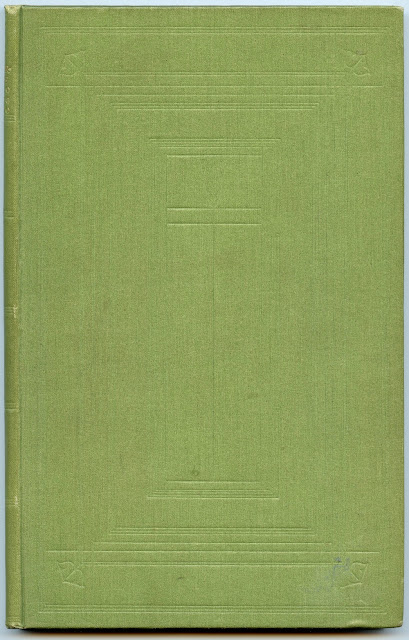 |
| Spines of Shakespeare's Richard III and Marlowe's Doctor Faustus (Vale Press, 1903) |
 |
| Marlowe's Doctor Faustus (Vale Press, 1903) |
This Volume was edited by T. Sturge Moore, and printed uniform with the volumes of Shakespeare, the border used being that of the Tragedies.
 |
| Colophon of Marlowe's Doctor Faustus (Vale Press, 1903) |
This edition of Doctor Faustus by Christopher Marlowe has been seen through the press by John Masefield.
Charles Holmes, the Vale Press's manager, had met John Masefield early on, and in his memoirs Self & Partners (Mostly Self) (1936), he mentioned Masefield once, in a chapter about a regular dining group at Roche's in Old Compton Street:
I particularly recall one evening when [Laurence] Binyon brought in a tall, bronzed young man in blue serge, with a grave quiet manner, whom he introduced to us as John Masefield the sailor-poet.
(p. 188)
Masefield remained unmentioned in his chapter about the Vale Press that alluded to quarrels with Sturge Moore over the proofs for the Shakespeare volumes. There is no written testimony (in print or in manuscript) that links Sturge Moore to the Marlowe volume, other than Ricketts's bibliography.
 |
| Colophon of Shakespeare's Richard III (Vale Press 1903) |
The two vertically placed decorative leaves that conclude the first part of the colophon (it continued at the bottom of the page stating the names of the publishers) were absent in the Marlowe volume, that, although issued simultaneously, was not part of the Shakespeare series. The lists of books that advertised the Vale Press volumes didn't mention the name of the editor. A Final List of Books to be Issued by Messrs. Hacon & Ricketts (1902) announced the book as 'the only book besides the Shakespeare printed in the Avon fount', and a Special Notice dated January 1903 stated: 'Non-subscribers to the Shak[e]speare may obtain Copies of this book, provided their orders are received before Feb. 1, 1903.' All copies were sold before the end of June.
Masefield was a young, but prolific writer, who by 1903 had published a book of poetry, an anonymous introduction in the catalogue of the Wolverhampton Art and Industrial Exhibition, 1902, and his edition of Poems by John Keats was to be published in September 1903. Moreover, he had published more than fifty prose fragments, poems and book reviews in newspapers and magazines such as The Tatler, The Speaker, The Pall Mall Magazine and The Academy.
Masefield was an up-and-coming man, and an acquaintance of the Vale Press coterie: Laurence Binyon had met him first at Yeats's house, in February 1901, went out of his way to get him commissions, and introduced him to Holmes (and others); Ricketts and Shannon were both very much involved in the 1902 Wolverhampton exhibition for which Masefield acted as secretary - which meant they corresponded and met at several occasions; Masefield, Ricketts and Shannon would be collaborators for the 1903 magazine The Venture; and Masefield was a member of a group of stage writers around W.B. Yeats, and the Marlowe edition aimed to financially support this group that was called - not officially, but in this colophon - the Romantic Stage Players. Several names were used for the stage initiatives, such as the Theatre Society for Romantic Drama, and The Masquers, - and Yeats was anxious that the money would be lost to his dramatic efforts - but when the Literary Theatre Club came into existence, the money raised with the publication of Marlowe's Doctor Faustus went to them.
The colophon of the book wouldn't have mentioned Masefield's name if he had not been involved in the editorial process. It was the only Vale Press book that contained his name. Masefield, as early as 1906, would claim the work as his in a listing of his work (see Philip W. Errington's John Masefield. The "Great Auk" of English Literature. A Bibliography, 2004, p. 576). Ricketts (not a bibliographer by training) simply made a mistake in his bibliography (not his only one).
At the time of publication, Masefield's name was mentioned (based on the book's colophon no doubt) in the Publisher's Weekly of 4 July 1903, in a message about the new publications of John Lane (co-distributor the Vale Press books in America): 'they announce another Vale Press volume, Marlowe's "Doctor Faustus," which has been seen through the press by John Masefield, and decorated by Charles Ricketts, under whose supervision the book has been printed for the benefit of The Romantic Stage Players. There will be only two more volumes of the Vale Press, after which the Press will suspend operations.'
And there is a particular copy of the book to be considered. The book appeared in May - the British Library copy is stamped '25 May 03' - and Masefield's own copy bears a presentation to his wife, dated 8 June 1903. That private copy would probably not have been dedicated by him, had he not been the editor.
 |
| Inscription by John Masefield to his wife, and Masefield's posthumous book label in his copy of Marlowe's Doctor Faustus (private collection) |
